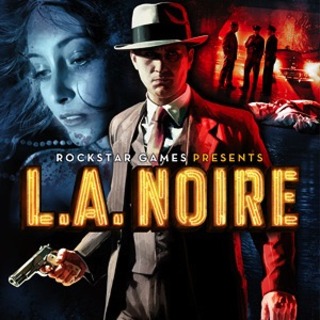Technical achievements aside, L.A. Noire manages to do something that few games can: force players to think, not shoot.
For the rest of you who are intrigued by the concept of a game that actually forces you to use critical thinking skills rather than your trigger finger, L.A. Noire provides a top-notch cinematic experience that will have you slapping your face at bad decisions and standing up and yelling triumphantly when you nail someone with perfectly gathered evidence. The whole experience is an exhilarating rush I've never felt before in a game.
If you've seen movies like L.A. Confidential or The Black Dahlia, then the setup should feel familiar. 1940's Noire cop drama. You play as Cole Phelps, former war hero in the Pacific theater looking to serve his country on home soil. He's an idealistic guy with a bit of a penchant for taking a leadership role. He's a character who is constantly in conflict, be it with a suspect, fellow cops, or his checkered past. He's a pretty linear and straightforward character, but he's a fantastic lead for the game.
Secondary, but equally important to an open-world game such as this is the world in which the events take place. Bondi's vision of 1940's L.A. is very lifelike, and while it lacks the colorful (and often crude) approach of Liberty City, the world feels just as alive, with just as many interesting characters and places to go. They went for a more true-to-life concept, rather than one that was always trying to get a chuckle out of you. The crooning jazz soundtrack channels the era delicately. It works very well with the tone of the game. The city is excellently modeled and is absolutely enormous.
Graphically, the game doesn't disappoint. The framerate certainly hitches from time to time while on foot, but it's rarely a major annoyance, because you tend to be so enamored with the task at hand. Many of the crime scenes that you investigate are amazingly designed, often picturesque locales that bleed a sense of realism that is difficult to ignore. But this game is about the character interactions, and the new technology that this game brings to character models has to be seen to be fully believed. The facial animations are second-to-none. You have never seen faces like these in a game. Ever. Any statement to the contrary is a lie.
So... How does the game play? This is the key thing that many people are dying to know. Well, it's kind of a mixed bag. Each case is like a self contained mission a-la GTA, but you have to finish the case at hand before you can go on to another one, although previous cases can be revisited at any time. You start out at the crime scene, gathering evidence and interviewing witnesses. Clues will lead you to other places and people. You continue to gather evidence over the course of the case until suspects begin to present themselves. You then interview possible suspects and charge the party you believe to be guilty with the crime. Now, that sound lovely on paper, but it's VERY easy to screw things up. This game is all about the human element, and it can be unbelievably tricky. For instance, interviewing a person at a grocery store who had contact with my victim, I found it difficult to tell whether the person was lying about having seen them the night of the murder. I called their bluff, and they spilled the beans. If I were to tell them that I believed their story, the information that they gave me by calling their bluff would never come out, meaning you can potentially miss case-breaking information if you aren't paying careful attention. Another thing that took me a while to understand is how to call a person's lie. If you think someone is lying about something, YOU ABSOLUTELY HAVE TO HAVE EVIDENCE! Otherwise, they can shut down entirely. It's this balance between evidence gathering and people skills that makes this game such a joy. I've never experienced anything even close to the thrill of nailing a suspect with evidence and calling their lie, forcing a confession and arrest. It's pretty awesome.
There is gunplay, but you've played it before. It's exactly the same as Red Dead Redemption, rather than GTA:IV. It works within the story, but the game isn't really a shooter. I've only been in gunfights about 5 times at the time of this writing. Don't go into this thinking you'll be taking out whole gangs every mission.
In the end, this game does something that few games do, and that's force the player to pay careful attention to something besides headshots. The joy of the game is in the details, and how expertly crafted the whole experience was designed. Even minute details can wind up playing a large role if you know how the pieces fit together. The better you are at critical thinking, and the more you love expertly written (and delivered) dialog, you will love this game more and more. It's safe to say this game is a technological leap forward in many ways, but the bar has been set higher in the gameplay department as well. In an age populated with too many games that rely on outright violence and combat, it's refreshing to see a well-known publisher come to the table with something entirely fresh and new that defies all the conventions, while still being a lovely jewel in their crown. This game is much more than just a tech demo with a few gimmicks. This is a full-fledged experience that draws you in and forces you to make tough decisions that go beyond morality questions. This is a game of degrees. And to that end, bravo Rockstar/Bondi. I want to see more companies take initiative like this and show that the gaming industry can be a responsible steward of art as well as entertainment.

